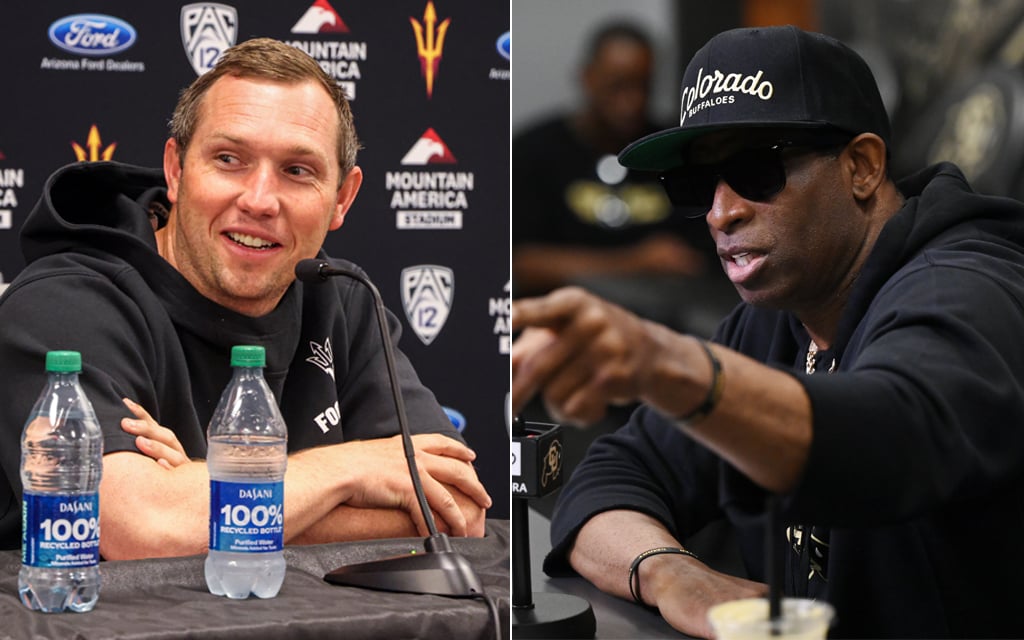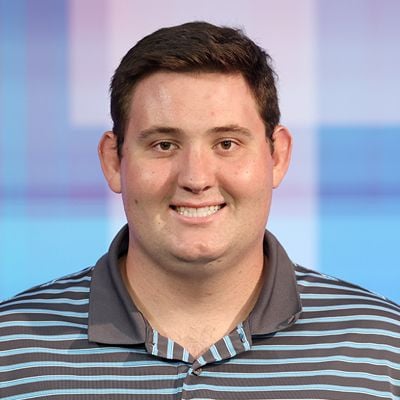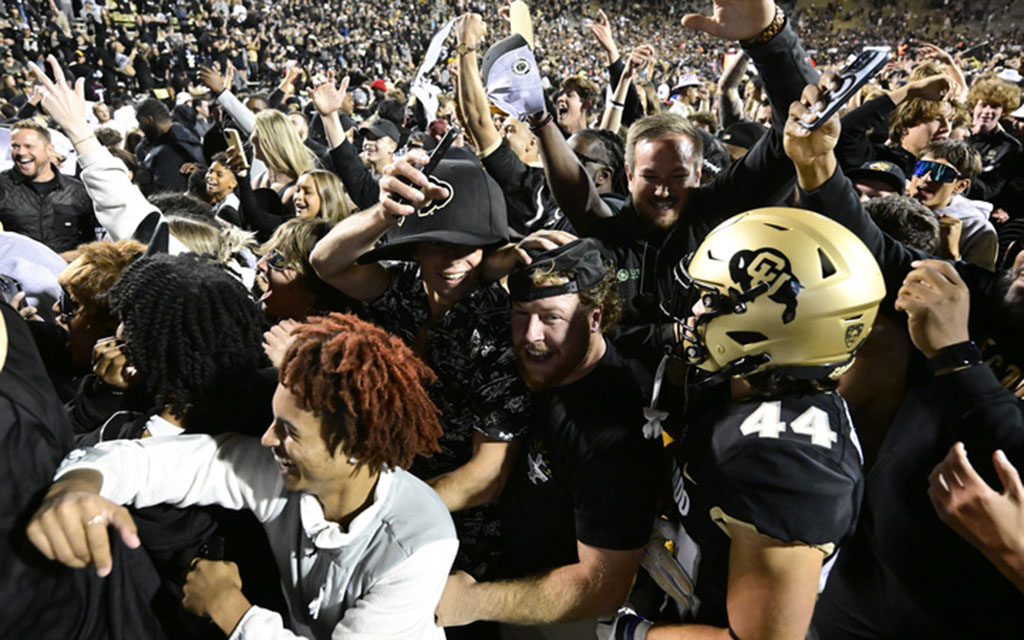
Arizona State coach Kenny Dillingham and Colorado coach Deion Sanders reenergize their respective programs and set the stage for Saturday’s highly anticipated matchup. (Photo by Griffin Greenberg/Cronkite News and Hyoung Chang/The Denver Post)
TEMPE – Eight days. Who knew that eight days in late 2022 would help inject life into a Pac-12 college football season that was supposed to be defined by the conference’s demise?
On Nov. 26, Arizona State hired Kenny Dillingham, 32, the youngest coach in the Power 5. The decision was widely praised but also scrutinized because of Dillingham’s young age and lack of head coaching experience.
On Dec. 3, Colorado hired Deion Sanders, the flashy and unguarded former NFL star who touched down in Boulder with the force of the tornadoes that often invade the state’s eastern plains.
On Saturday, the two first-year coaches square off in Mountain America Stadium. Both took over programs that had hit rock bottom, and both have re-energized their fan bases, Colorado’s, to an unprecedented level in Boulder. It’s a complementary storyline to the one about the conference’s dramatic resurgence, this week sporting six teams among the top 15 ranked in the country.
But how did that week in 2022 unfold?
Rocky Mountain high
For Colorado, Sanders was the top target for athletic director Rick George. Sanders was one of the first calls he made “very early in the process,” George said in a video produced by Colorado athletics.
On that call, George described what Sanders was missing in Colorado and sent pictures to Sanders of a snow-covered Folsom Field, followed by another one later that day showing the snow in the stadium had melted.
“When I got that call from Rick, I said to myself, ‘It’s cold up there,’” Sanders said.
Still, George left an impression on Sanders.
“Rick has a way of presenting something that only he can. It’s the way he does it,” Sanders said. “He’s not lying, not falsifying anything, and he’s not selling anything. His passion for the university just bled through.”
After that call, George felt the Buffaloes had a chance. He flew to Mississippi to visit with Sanders and his family in the Jackson State coach’s home.
They connected. George remembers that they were both “on the same page about where this program could go.” He returned home to wait for an answer.
On Nov. 26, the same day ASU hired Dillingham, Sanders received an official offer from Colorado. A few days later, as George sat at a Dallas airport preparing to return home after College Football Playoff Selection Committee meetings, his phone rang.
“Rick,” Sanders said. “I’m coming.”
George’s response?
“Excuse me?”
Locally produced
By contrast, ASU’s process began as a “coast-to-coast extensive search” for the right candidate to be the Sun Devils’ head coach. The program used various resources, including the talent acquisition firm Korn Ferry, an internal group inside the athletic department, and a donor/alumni group to advise the department.
Throughout the long search for the right man, Ray Anderson, the vice president for university athletics, and his athletic department colleagues had a vision for the type of coach they wanted. They needed someone “relatable to the new era of student-athlete,” he said. They wanted someone with experience but also someone passionate about ASU.
As Arizona State began to look for its new head coach, Dillingham’s name stood out. His passion for ASU began long before interviewing for the head coach position. He was raised in Scottsdale and grew up a Sun Devils fan, eventually graduating from Tempe in 2013, so the Sun Devils roots were planted well before he was a candidate for the job.
“We will be looking for someone that is more in tune with the evolving change and landscape of college athletics,” Anderson said on Sept. 18, the day Edwards was let go. “It’s changing, as you know, rapidly, and you got to have someone willing to take all that additional change on because it’s going to continue to change.”
Dillingham’s recruiting chops and highly regarded coaching expertise caught the attention of Anderson, who was hungry for a fresh replacement for Edwards, 68, who was fired early on in a soon-to-be 3-9 season and in the shadow of an NCAA investigation.
They found their answer in Dillingham. He was hired on Nov. 26 and officially announced as the 26th football head coach the next day.
“As young as he is at 32, the multitude of accomplishments, experiences and successes that Dillingham brought to the table was undeniable,” Anderson said at Dillingham’s introduction press conference. “This is a place where you need someone who loves this community, loves this university, loves this state. And I believe that when you get a chance to bring them home, you bring them home.”
How it started
Those late 2022 dates weren’t when the rebuilds started, however. For ASU, the end of the previous regime was on Sept. 18 when the program mutually parted ways with Edwards following a shocking 30-21 loss to Eastern Michigan the night before. ASU finished 3-9 and lost five of its last six games under interim head coach Shaun Aguano.
That one ASU win late in the season was against its rebuilding counterpart, Colorado, who had just as disastrous a year as the Sun Devils. The Buffalos were one of the worst teams in Division I football last season. They went 1-11, with the only win coming against California in overtime on Oct. 15. Former coach Karl Dorrell was fired on Oct. 5 after starting 0-5, leaving the door open for Sanders to come in.
Before Sanders and Dillingham became Pac-12 rivals, their paths crossed years before. According to Sanders, he tried to recruit Dillingham to be part of a staff he was building for a program he didn’t disclose. They communicated “quite a bit,” Sanders said. Along with that connection, Dillingham also tried to recruit Sanders’ son, Shedeur Sanders, when Dillingham was the offensive coordinator at Auburn.
“One of the things I learned in that process was that when I recruited Shedeur, I recruited Sheduer. I didn’t recruit Deion,” Dillingham said. “He didn’t make the process in his son’s recruitment about him. Yes, he did play the father figure and answered the father figure questions, but he let his son go through the process, and I have a lot of respect for that.”
How it’s going
Almost a year later, the two rebuilds have gotten off to different starts despite both retooling the roster through the transfer portal. Sanders’ Buffaloes have captivated the nation as one of the most surprising teams in college football. They are 3-2, exceeding expectations, and have been must-see TV with quarterback Shedeur Sanders and two-way player Travis Hunter starring for Colorado. Dillingham’s Sun Devils have been more traditional in rebuilding, as they’ve struggled with injuries and a lack of talent, leading to a 1-4 record to start the season.
Despite the disappointing start to the Dillingham era at ASU, his counterpart in Boulder believes Dillingham is the right man for the job.
“He’s that guy. I know he’s been more than capable,” Sanders said in a press conference on Tuesday. “When I saw him get this opportunity, I was ecstatic. I know his climb and what kind of man he is. He is great for their program and great for college football. He is a tremendous mind. He’s going to be a great head coach.”
While Colorado has looked closer to a finished product, these two teams have mirrored their processes, from ending one era a year ago to both starting new chapters of their football program before they meet on the field.


